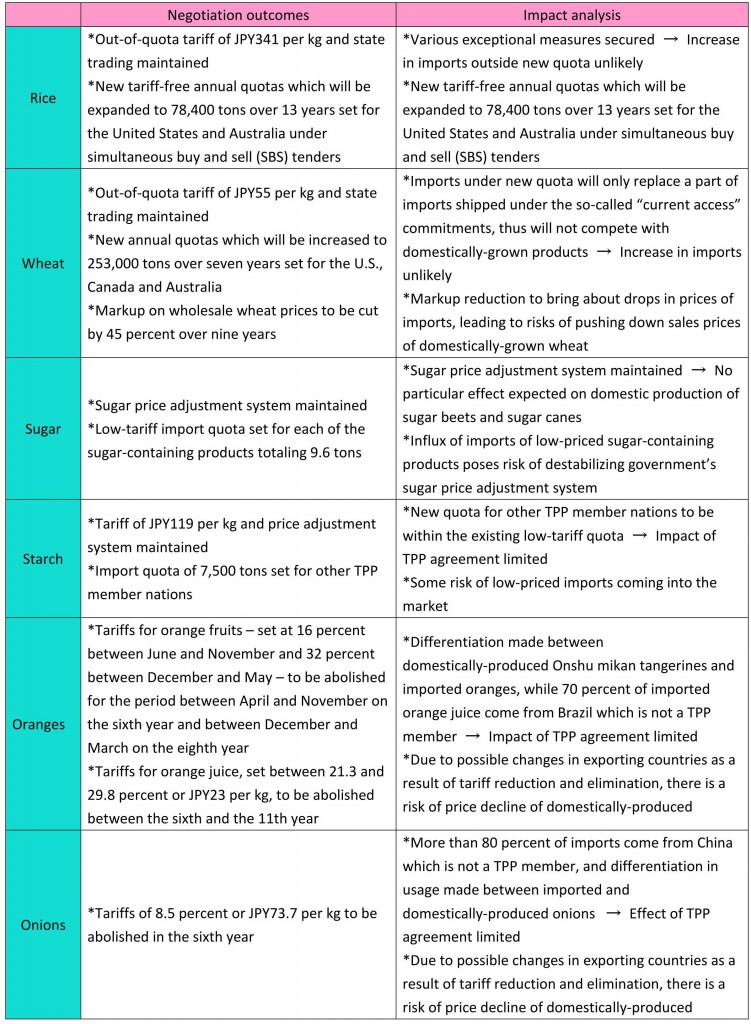Agriculture ministry’s impact analysis of TPP agreement

The agriculture ministry announced on Thursday, Oct. 29, that 12 out of 21 agricultural items will face price declines affected by imports of low-priced products as a result of the Trans-Pacific Partnership free-trade agreement. The ministry’s analysis of the agreement’s impact on products including rice, wheat, sugar and some vegetables and fruits indicates the government acknowledges that domestic producers of a wide range of items will be negatively affected by the agreement.
The ministry classified the 21 items into three categories: rice, wheat and barley under the category of “unrestricted increase in imports unlikely”; 10 items such as starch under “limited impact expected”; eight items such as sugar under “no particular impact expected.”
Based on the analysis, the ministry predicts possible price drops in the domestic markets for 12 items: rice, wheat, barley, Onshu mikan tangerines and mikan juice, apples and apple juice, cherries, grapes, tomatoes for processing, pumpkins, asparagus, onions and carrots. The ministry also took into consideration long-term impacts, such as possible changes in exporting countries due to tariff reduction or abolishment.
The ministry warns rice prices will be cut if more rice is marketed as a result of new import quotas for the United States and Australia. It says measures should be taken to avoid adverse effects to growers of table rice, such as through the government’s purchases of imported rice as rice reserve and increasing competitiveness of domestically-grown rice. Besides the import quotas, the ministry says increase in imports is unlikely, as tariffs and government-controlled trading system are maintained.
Import quotas will be established also for wheat and barley, but the ministry believes increase in imports is unlikely, because they will not replace domestically-grown products. However, it predicts prices of imported wheat will decline as a result of cuts in the markup, which could have adverse effects on prices of domestically-grown wheat.
Among the 10 items which come under the category of “limited impact expected,” the ministry pointed out possible price drops for all products except for starch. Even for starch, it warned of possible imports of low-priced products.
The ministry said no particular impact is expected for sugar, malt, adzuki beans, kidney beans, peanuts, pineapples, teas and konnyaku. But it hinted at the possibility of low-priced sugar-containing products coming into the domestic market as a result of new low-tariff import quotas, which could threaten stable management of the sugar price adjustment system.
The ministry is analyzing the effects of the TPP agreement on some 40 items. The results of analysis on items which are more likely to be affected, such as beef, pork and dairy products, will be announced on Wednesday, Nov. 4.
Based on the analysis, the government and the ruling bloc are expected to discuss this month possible measures to support domestic farmers. However, experts say there are limits to the ministry’s analysis because it does not take into consideration how the abolition of tariffs on some products could influence consumption of other products. Growers of products which are analyzed as being little affected are likely to object to the ministry’s view.
(Oct. 30, 2015)

